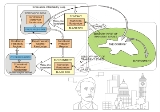
Cybernetics
Overview
Structure
Structure is a fundamental, tangible or intangible notion referring to the recognition, observation, nature, and permanence of patterns and relationships of entities. This notion may itself be an object, such as a built structure, or an attribute, such as the structure of society...
of regulatory systems. Cybernetics is closely related to information theory
Information theory
Information theory is a branch of applied mathematics and electrical engineering involving the quantification of information. Information theory was developed by Claude E. Shannon to find fundamental limits on signal processing operations such as compressing data and on reliably storing and...
, control theory
Control theory
Control theory is an interdisciplinary branch of engineering and mathematics that deals with the behavior of dynamical systems. The desired output of a system is called the reference...
and systems theory
Systems theory
Systems theory is the transdisciplinary study of systems in general, with the goal of elucidating principles that can be applied to all types of systems at all nesting levels in all fields of research...
, at least in its first-order form. (Second-order cybernetics
Second-order cybernetics
Second-order cybernetics, also known as the cybernetics of cybernetics, investigates the construction of models of cybernetic systems. It investigates cybernetics with awareness that the investigators are part of the system, and of the importance of self-referentiality, self-organizing, the...
has crucial methodological and epistemological implications that are fundamental to the field as a whole.) Both in its origins and in its evolution in the second half of the 20th century, cybernetics is equally applicable to physical and social (that is, language-based) systems.
Cybernetics is most applicable when the system being analysed is involved in a closed signal loop; that is, where action by the system causes some change in its environment and that change is fed to the system via information (feedback) that causes the system to adapt to these new conditions: the system's changes affect its behavior.
Unanswered Questions

